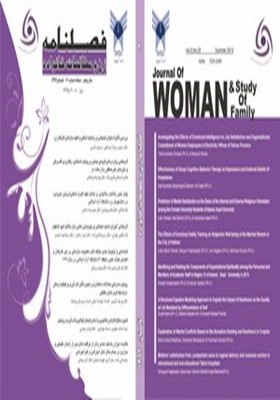بررسی تأثیرات هوش هیجانی بر رضایت شغلی و تعهد سازمانی کارکنان زن (مورد مطالعه: ادارات برق استان تهران)
محورهای موضوعی : زن و خانواده
کلید واژه: هوش هیجانی, رضایت شغلی و تعهد سازمانی,
چکیده مقاله :
این مقاله بررسی تاثیرات هوش هیجانی بر رضایت شغلی و تعهد سازمانی کارکنان زن در ادارات برق استان تهران را بررسی می کند. با استفاده از فرمول کوکران و روش نمونه گیری تصادفی تعداد 92 نفر برای مطالعه انتخاب شدند. برای جمع آوری اطلاعات و اندازه گیری متغیرها از سه پرسشنامه استفاده شده است. برای اندازه گیری هوش هیجانی از مدل بار آن، برای اندازه گیری رضایت شغلی از شاخص توصیف شغل و برای اندازه گیری تعهد سازمانی از مدل آلن و میر به کار رفته است. در تجزیه و تحلیل داده ها از روش مدلسازی معادلات ساختاری حداقل مربعات جزئی استفاده شده است. نتایج تحقیق نشان می دهد که هوش هیجانی بر هر دو متغیر رضایت شغلی و تعهد سازمانی تأثیر دارد. همچنین تأثیر رضایت شغلی بر تعهد سازمانی مورد تأیید قرار می گیرد.
This paper seeks to investigate the effects of emotional intelligence on woman employee’s job satisfaction and commitment in electricity offices of Tehran Province. By using Cochran formula and random sampling method, 92 people were selected. For gathering data and measuring the variables, we used 3 questionnaires. Bar-on, job description and Allen-Meyer model were used for measuring emotional intelligence, satisfaction and commitment, respectively. For analyzing the data, structural equations modeling by PLS has been used. The results show that emotional intelligence has a positive effect on both satisfaction and commitment of women employees in electricity offices of Tehran province.
- حسنخویی، سیما(1385)، بررسی رابطة بین هوش هیجانی و مهار شغلی با رضایت شغلی مدیران مدارس شهر بیرجند در سال 84-1385. پایان نامة کارشناسی ارشد، دانشگاه الزهرا.
- حسین زاده، داوود؛ صائمیان، آذر(1381)، خشنودی شغلی توجه به کارکنان و کیفیت زندگی کاری. نشریه مدیریت، شماره 66 ، صص9-1.
- رابینز، پی استیفن (1387)، مبانی رفتار سازمانی. ترجمه علی پارسائیان و سیدمحمد اعرابی. تهران: دفتر پژوهش های فرهنگی. سال تألیف به زبان اصلی 1986.
- زهرایی، شقایق(1385)، تاثیر آموزش برخی مولفه های هوش هیجانی بر رضایت شغلی و بهره وری کارکنان شرکت مهندسی و ساخت تاسیسات دریایی ایران، پایان نامه کارشناسی ارشد مدیریت، دانشکده علوم اجتماعی، دانشگاه الزهرا.
- محسن علیق،امیه(1386)، مطالعه بین فرهنگی هوش هیجانی، فرآیندهای نظام هیجانی و توانمندی روانی-اجتماعی بین دانشجویان ایرانی و لبنانی، پایان نامه کارشناسی ارشد، دانشکده علوم انسانی، دانشگاه تربیت مدرس.
- محقق مطلق، مریم(1379)، بررسی رابطه ی بین شخصیت و رضایت شغلی در کارکنان دانشگاه تربیت مدرس، پایان نامه کارشناسی ارشد مدیریت، دانشکده علوم انسانی، پایان نامه دانشگاه تربیت مدرس.
- مهداد، علی (1385)، روانشناسی امور کارکنان. اصفهان: جنگل.
- مهداد، علی (1384)، روانشناسی صنعتی سازمانی. اصفهان: جنگل.
- نیکوگفتار، منصوره(1385)، "نقش آموزش هوش هیجانی در پیشرفت تحصیلی و سلامت عمومی دانش آموزان، پایان نامه کارشناسی ارشد روانشناسی، دانشکده علوم انسانی، دانشگاه تربیت مدرس.
- هاشمی، عصمت(1386)، بررسی رابطه ی هوش هیجانی با کمرویی در نوجوانان، پایان نامه کارشناسی ارشد روانشناسی، دانشکده علوم انسانی،دانشگاه تربیت مدرس.
- Allen, N.J. and Meyer, J.P.(1997), “Affective, continuance, and normative commitment to the organization: an examination of construct validity”, Journal of Vocational Behavior, Vol. 49 .No. 3, pp. 252-76.
- Allen N, Meyer J (1990), the measurement of affective, continuance and normative commitment to the organization. J. Occup. Psychol. 63:1-18.
- Azar A (2013), Path-structural modeling in management, Tehran, Negah Danesh. pp 155-180.
- Bar-on. R. & Parker. J. D. A. (1997), Handbook of Emotional Intelligence. San Francisco: Josse – Bass.
- Bloisi, Wendy, (2007), an introduction to human resource management, first edition, London, McGraw-hill.
- Brief.A.p. & Motowidlo. J.(1986), Prosocial organizational behaviors. Academy of Management Review, 10, 710-725.
- Dong, &., Howard, T. (2006), Emotional intelligence Trust and Job satisfaction. Competition forum. Vol 4, Issue 2. p381.
- Mowday, R.T.(1998), Employee-Organizational Linkages: The Psychology of Commitment, Absenteeism and Turnover. Academic Press, New York.
- Othman, S., Anugerah, R. (2009), Effects of Emotional intelligence and career commitment on career success. (From: http://mgv. Mim. Edu. My’s/MMR/O 206/020606.Htm).
- Goleman, D.(1998), Working with emotional intelligence. New York: bantam.
- Mayer, J. D. Salovey, P.(2002),What is emotional intelligence? Educational implications,pp 3-31. New York: Basic Books.
- Guleryaz, G., Guney, S., Miski Aydin, E., Asan, (2008), The mediating effect of Job satisfaction between emotional intelligence and organizational commitment of nurses: A questionnaire survey. International Journal of nursing studies. Ns: 1304, No of pages 11.
- Hosseinian, S., Monavar yazdi, S., Zahraie, sh., Fatehi-Ashtiani, A. (2008), Emotion intelligence and Job satisfaction. Journal of Applied sciences, & (5): 903-906.
- Lordanoglou, D. (2008), The teacher as Leader: the relationship effectiveness, emotional intelligence and Leadership effectiveness, commitment, and satisfaction. Journal of Leadership studies, vol 1 Issue3, pages 57- 66.
- Millet, T. (2007), An examination of trait emotional intelligence factors: their relationship to job satisfaction among police officers. Proquest information and learning company, 300 North zeeb road POBox 1346, UMI number 3283704.
- Ozturk, A., Deniz, M. (2008), Analysis of Emotional intelligence Job satisfaction and Burnout Levels of preschool Teachers According to some variables. Elementary Education online, 7 (3), 578-599.
- Sheldon M (1971), Investment and involvements as mechanisms producing commitment to the organization, administrative science quarterly, vol. 16. Pp 29- 47.
- Smith PC, Kendall LM, Hulin CL (1969), the measurement of satisfaction in work and retirement. Chicago: rand McNally. pp77- 81.
- Stys, yvonni & Brown, shelly L. (2004), A Review of Emotional intelligence Literature and implication for correction. Research Branch correctional servicer of Canada.
- Sy, Thomas, S. Tram A. (2006), Relation of employee and manager emotional intelligence to job satisfaction and performance. Journal of vocational behavior, Vol.68, PP: 461-4

